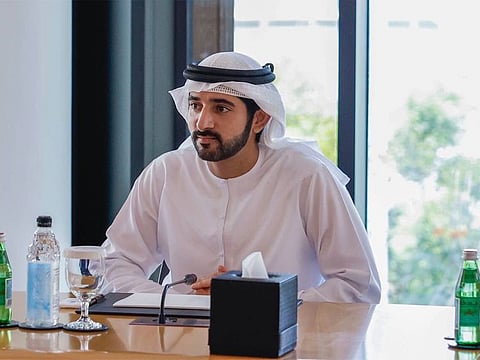Sheikh Hamdan launches Dubai’s metaverse strategy
Sector to contribute Dh4 billion to national economy in five years

A new strategy that seeks to increase the presence of blockchain and metaverse companies in Dubai by five times was unveiled in Dubai on Monday.
Launched by Sheikh Hamdan bin Mohammed bin Rashid Al Maktoum, Crown Prince of Dubai and Chairman of the Dubai Executive Council, the metaverse strategy aims to rank Dubai among the top 10 cities in the world in the sector, and contribute Dh4 billion to the national economy over five years, along with supporting the creation of 40,000 virtual jobs.
“We launched today the Dubai Metaverse Strategy. The next revolution in technological and economic fields will impact all aspects of life during the next two decades. We have 1,000 companies in Dubai currently working in this sector, which contribute $500 million to our national economy. We expect it to rise strongly during the coming period,” Sheikh Hamdan said.
The strategy will also prioritise upgrading distinguished talents in the field of metaverse through education and training, as well as developing metaverse applications and using them in Dubai government institutions.
Commenting on the launch of the strategy, Omar bin Sultan Al Olama, Minister of State for Artificial intelligence, Digital Economy and Remote Work Applications, and Deputy Managing Director of the Dubai Future Foundation, reiterated the importance of designing the future with new digital strategies for adopting the metaverse in vital sectors. He added that the metaverse would drive the UAE’s and Dubai’s efforts to provide innovative solutions, positively impact people’s lives, and transform the city into one of the smartest hubs worldwide offering new economic opportunities.
Al Olama said the Dubai Metaverse Strategy is in line with the objectives of the UAE AI Strategy to enhance the country’s status as one of the world’s leading countries in futuristic sectors by investing in new initiatives and empowering talent to drive digital transformation and the adoption of future technologies.
Fostering innovation
The metaverse strategy aims to foster innovation, enhance the metaverse’s economic contributions through R&D collaborations, and promote advanced ecosystems utilising accelerators and incubators that attract companies and projects to Dubai.
It also supports the development of Web3 technology and its applications to create new governmental work models and development in vital sectors, including tourism, education, retail, remote work, healthcare, and the legal sector. The strategy also aims to develop global standards in building safe and secure platforms for users and develop metaverse infrastructure and regulations to accelerate the adoption of these technologies.
Key pillars
The strategy’s key pillars focus on extended reality (which blends the physical and virtual worlds), augmented reality, virtual reality, mixed reality, and digital twins (a virtual representation of an object or system). The strategy aims at leveraging real-time data, using machine learning and IoT, and employing AI simulation and blockchain to enhance the human thinking processes.
Data, network, cloud, and edge computing are technology pillars of the metaverse strategy that focus on real-world data that is obtained, validated, stored, processed, and managed. Other pillars include promoting the full deployment of 5G networks to enable edge computing and provide on-demand computer system resources. Edge computing allows data to be collected, stored, and processed locally via smart devices and local networks instead of the cloud.
Boosting the economy
VR and AR are two key enablers of the metaverse, responsible for 6,700 jobs and contributing $500 million to the UAE’s economy, which is expected to increase significantly in the future. The metaverse provides an array of economic opportunities. Globally, the value of venture capital and private equity financing in the metaverse reached $13 billion in 2021, while real estate sales in the metaverse surpassed $500 million last year.
Analysts estimate that the metaverse will contribute up to $5 trillion to the global economy by 2030. The market value of NFTs is expected to reach $80 billion, while consumer spending on in-game purchases is reckoned to reach $75 billion by 2025. Recent studies show that the daily active users on Roblox, one of the leading global metaverse communities, has increased to 55 million. At the same time, 59% of global consumers are keen to transition at least one of their everyday activities to the metaverse.







